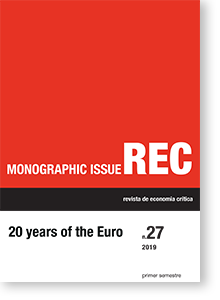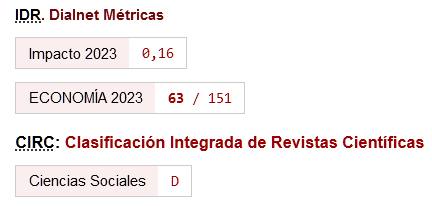The past and the future of the Euro
Palabras clave:
EMU, monetary policy , fiscal policy , political integrationResumen
This contribution discusses the experience of the euro, and the extent to which its future is promising. The discussion begins with the Economic and Monetary Union (EMU) theoretical framework and policies, and adopted by the European Central Bank (ECB), and the extent to which fiscal policy, pursued by the EMU member countries, and monetary policy, pursued by the ECB, have been successful. The theoretical background of this approach is based on the New Consensus Macroeconomics (NCM), but it differs; and this is elaborated upon and discussed extensively. This discussion inevitably includes the post Global Financial Crisis (GFC), the Great Recession (GR) and the euro-crisis period in an attempt to examine the consistency of the theoretical background and the fiscal and monetary policies pursued. In terms of the future of the euro, the discussion just suggested enables this contribution to conclude that the extent to which the euro would survive requires further economic policies. Such policies, in addition to the current monetary policy, should be especially proper EMU fiscal policy, and other policies as discussed in this contribution. In effect this amounts to the suggestion that political integration is what is required to enable the euro to survive in the future.
Descargas
Citas
Angeriz, A., Arestis, P. and McCombie, J. (2008): "Does Central Bank Independence Affect Inflation Persistence and Volatility?", CCEPP Working Paper, Cambridge Centre for Economic and Public Policy, Department of Land Economy, University of Cambridge.
Angeriz, A. and Arestis, P. (2007): "Monetary Policy in the UK", Cambridge Journal of Economics, 31(6), pp. 863-884.
https://doi.org/10.1093/cje/bem014
Angeriz, A. and Arestis, P. (2008): "Assessing Inflation Targeting Through Intervention Analysis", Oxford Economic Papers, 60(2), pp. 293-317.
https://doi.org/10.1093/oep/gpm047
Arestis, P. (2007): "What is the New Consensus in Macroeconomics?", in P. Arestis (ed.), Is There a New Consensus in Macroeconomics?, Houndmills, Basingstoke: Palgrave Macmillan.
Arestis, P. (2012): "Fiscal Policy: A Strong Macroeconomic Role", Review of Keynesian Economics, Inaugural Issue, Vol. 1, No. 1, pp. 93-108.
https://doi.org/10.4337/roke.2012.01.06
Arestis, P (2015): "Coordination of Fiscal with Monetary and Financial Stability Policies Can Better Cure Unemployment", Review of Keynesian Economics, 3(2), pp. 233-247.
https://doi.org/10.4337/roke.2015.02.07
Arestis, P. (2016): "Can the Report of the 'Five Presidents' Save the Euro?", European Journal of Economics and Economic Policies: Intervention (EJEEP), 13(1), pp. 28-38.
https://doi.org/10.4337/ejeep.2016.01.04
Arestis, P. (2018): "Monetary Policy since the Global Financial Crisis", in P. Arestis and M. Sawyer (eds.), Economic Policies since the Global Financial Crisis, Annual Edition of International Papers in Political Economy, Houndmills, Basingstoke: Palgrave Macmillan.
https://doi.org/10.1007/978-3-319-60459-6
Arestis, P. and Sawyer, M. (2006a): "Alternatives for the Policy Framework of the Euro", in W. Mitchell, J. Muysken and T.V. Veen (eds.), Growth and Cohesion in the European Union: The Impact of Macroeconomic Policy, Cheltenham: Edward Elgar Publishing Limited.
https://doi.org/10.4337/9781781956366.00010
Arestis, P. and Sawyer, M. (2006b): "Reflections on the Experience of the Euro: Lessons for the Americas" in M. Vernengo (ed.), Monetary Integration and Dollarization: No Panacea, Cheltenham: Edward Elgar Publishing Limited.
https://doi.org/10.4337/9781847200259.00011
Arestis, P. and Sawyer, M. (2006c): "Macroeconomic Policy and the European Constitution", in P. Arestis and M. Sawyer (eds), Alternative Perspectives on Economic Policies in the European Union, Annual Edition of International Papers in Political Economy, Houndmills, Basingstoke: Palgrave Macmillan.
https://doi.org/10.1057/9780230627352_1
Arestis, P. and Sawyer, M.C. (2012): "Can the Euro Survive after the European Crisis?", in P. Arestis and M.C. Sawyer (eds.), The Euro Crisis, Annual Edition of International Papers in Political Economy, Houndmills, Basingstoke: Palgrave Macmillan.
https://doi.org/10.1057/9780230393547
Bank of International Settlements (BIS) (2011): "Fiscal Policy and its Implications for Monetary and Financial Stability", BIS Papers, No. 59, December, Basel, Switzerland: Bank for International Settlements. Available at: http://ssrn.com/abstract=2002654
Berger, H., Dell'Ariccia, G. and Obstfeld, M. (2018): "The Euro Area Needs a Fiscal Union", IMF Blog, 22 February.
https://doi.org/10.5089/9781484340424.087
Corsetti, G., Dedola, L., Jarociński, M., Maćkowiak, B. and Schmidt, S. (2016): "Macroeconomic Stabilization, Monetary-Fiscal Interactions, and Europe's Monetary Union", Discussion Paper No. 1988, December, Frankfurt: Germany: European Central Bank.
https://doi.org/10.2139/ssrn.2910881
Draghi, M. (2016a): "On the Importance of Policy Alignment to Fulfil Our Economic Potential", 5th Annual Tommaso Padoa-Schioppa Lecture at the Brussels Economic Forum 2016, Brussels, 9 June. Available at: https://www.ecb.europa.eu/press/key/date/2016/html/sp160609.en.html
Draghi, M. (2016b): "Stability, Equity and Monetary Policy", 2nd DIW Europe Lecture, German Institute for Economic Research (DIW), Berlin, 25 October. Available at: https://www.ecb.europa.eu/press/key/date/2016/html/sp161025.en.html
European Central Bank (ECB) (2004): The Monetary Policy of the ECB, Frankfurt: European Central Bank, pp. 1-126.
European Commission (2000): Public Finances in EMU, European Commission: Brussels, Belgium.
European Commission (2015): Completing Europe's Economic and Monetary Union, Report by J-C. Juncker, in Close Cooperation with D. Tusk, J.Dijsselbloem, M. Draghi and M. Schulz, European Commission: Brussels, Belgium.
Forder, J. (2004): "The Theory of Creditability: Confusions, Limitations and Dangers" in P. Arestis and M. Sawyer (eds), Neo-Liberal Economics Policy, Cheltenham, UK: Edward Elgar.
https://doi.org/10.4337/9781845423322.00009
Harcourt, G.C., Kriesler, P. and Halevi, J. (2018): "Central Bank Independence Revisited", UNSW Business School Research Paper No. 2018 ECON 01, University of New South Wales, Sydney, Australia.
https://doi.org/10.2139/ssrn.3120107
IMF (2015): "Euro Area Policies: Selected Issues", IMF Country Report No. 15/205, July, Washington D.C.: International Monetary Fund.
https://doi.org/10.5089/9781513523088.002
Lagarde, C. (2018): "Speech at the Europe Lecture", German Institute for Economic Research (DIW), Berlin, Germany, 26 March.
Orphanides, A. (2017): "The Fiscal-Monetary Policy Mix in the Euro Area: Challenges at the Zero Lower Bound", MIT Sloan School Working Paper 5197-17, MIT Sloan School of Management, Massachusetts Institute of Technology, Cambridge, Massachusetts.
https://doi.org/10.2139/ssrn.2965805
Yellen, J.L. (2017): "A Challenging Decade and a Question for the Future", The 2017 Herbert Stein Memorial Lecture, Washington DC, USA.
Descargas
Publicado
Cómo citar
Número
Sección
Licencia
Esta licencia permite a terceros compartir (copiar y redistribuir el material en cualquier medio o formato) y adaptar (remezclar, transformar y crear a partir del material para cualquier finalidad, incluso comercial), siempre que se reconozca la autoría y la primera publicación en esta revista (La Revista, DOI de la obra), se proporcione un enlace a la licencia y se indique si se han realizado cambios en la obra.







